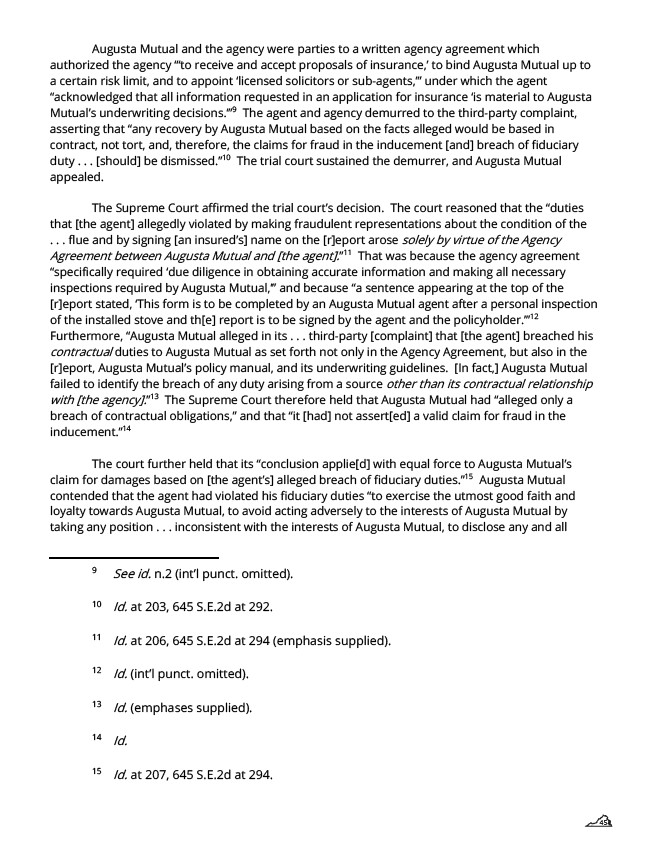
45
Augusta Mutual and the agency were parties to a written agency agreement which
authorized the agency “‘to receive and accept proposals of insurance,’ to bind Augusta Mutual up to
a certain risk limit, and to appoint ‘licensed solicitors or sub-agents,’” under which the agent
“acknowledged that all information requested in an application for insurance ‘is material to Augusta
Mutual’s underwriting decisions.’”9 The agent and agency demurred to the third-party complaint,
asserting that “any recovery by Augusta Mutual based on the facts alleged would be based in
contract, not tort, and, therefore, the claims for fraud in the inducement and breach of fiduciary
duty . . . should be dismissed.”10 The trial court sustained the demurrer, and Augusta Mutual
appealed.
The Supreme Court affirmed the trial court’s decision. The court reasoned that the “duties
that the agent allegedly violated by making fraudulent representations about the condition of the
. . . flue and by signing an insured’s name on the report arose solely by virtue of the Agency
Agreement between Augusta Mutual and the agent.”11 That was because the agency agreement
“specifically required ‘due diligence in obtaining accurate information and making all necessary
inspections required by Augusta Mutual,’” and because “a sentence appearing at the top of the
report stated, ‘This form is to be completed by an Augusta Mutual agent after a personal inspection
of the installed stove and the report is to be signed by the agent and the policyholder.’”12
Furthermore, “Augusta Mutual alleged in its . . . third-party complaint that the agent breached his
contractual duties to Augusta Mutual as set forth not only in the Agency Agreement, but also in the
report, Augusta Mutual’s policy manual, and its underwriting guidelines. In fact, Augusta Mutual
failed to identify the breach of any duty arising from a source other than its contractual relationship
with the agency.”13 The Supreme Court therefore held that Augusta Mutual had “alleged only a
breach of contractual obligations,” and that “it had not asserted a valid claim for fraud in the
inducement.”14
The court further held that its “conclusion applied with equal force to Augusta Mutual’s
claim for damages based on the agent’s alleged breach of fiduciary duties.”15 Augusta Mutual
contended that the agent had violated his fiduciary duties “to exercise the utmost good faith and
loyalty towards Augusta Mutual, to avoid acting adversely to the interests of Augusta Mutual by
taking any position . . . inconsistent with the interests of Augusta Mutual, to disclose any and all
- 4 -
9 See id. n.2 (int’l punct. omitted).
10 Id. at 203, 645 S.E.2d at 292.
11 Id. at 206, 645 S.E.2d at 294 (emphasis supplied).
12 Id. (int’l punct. omitted).
13 Id. (emphases supplied).
14 Id.
15 Id. at 207, 645 S.E.2d at 294.